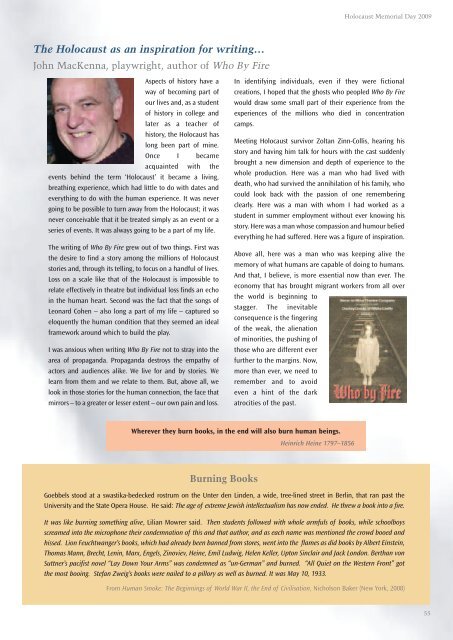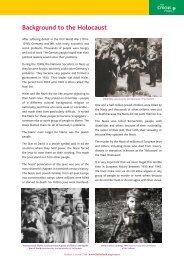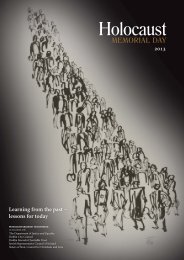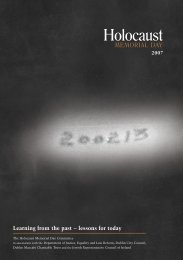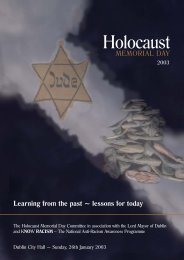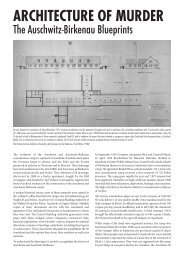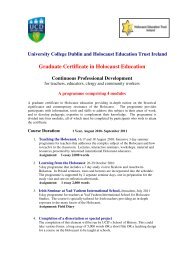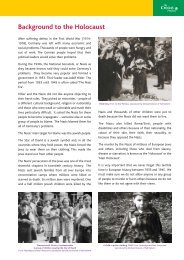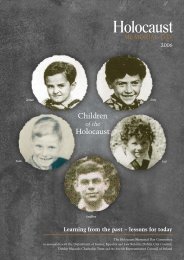Learning from the past ~ lessons for today - Holocaust Education ...
Learning from the past ~ lessons for today - Holocaust Education ...
Learning from the past ~ lessons for today - Holocaust Education ...
You also want an ePaper? Increase the reach of your titles
YUMPU automatically turns print PDFs into web optimized ePapers that Google loves.
<strong>Holocaust</strong> Memorial Day 2009<br />
The <strong>Holocaust</strong> as an inspiration <strong>for</strong> writing…<br />
John MacKenna, playwright, author of Who By Fire<br />
Aspects of history have a<br />
way of becoming part of<br />
our lives and, as a student<br />
of history in college and<br />
later as a teacher of<br />
history, <strong>the</strong> <strong>Holocaust</strong> has<br />
long been part of mine.<br />
Once I became<br />
acquainted with <strong>the</strong><br />
events behind <strong>the</strong> term ‘<strong>Holocaust</strong>’ it became a living,<br />
breathing experience, which had little to do with dates and<br />
everything to do with <strong>the</strong> human experience. It was never<br />
going to be possible to turn away <strong>from</strong> <strong>the</strong> <strong>Holocaust</strong>; it was<br />
never conceivable that it be treated simply as an event or a<br />
series of events. It was always going to be a part of my life.<br />
The writing of Who By Fire grew out of two things. First was<br />
<strong>the</strong> desire to find a story among <strong>the</strong> millions of <strong>Holocaust</strong><br />
stories and, through its telling, to focus on a handful of lives.<br />
Loss on a scale like that of <strong>the</strong> <strong>Holocaust</strong> is impossible to<br />
relate effectively in <strong>the</strong>atre but individual loss finds an echo<br />
in <strong>the</strong> human heart. Second was <strong>the</strong> fact that <strong>the</strong> songs of<br />
Leonard Cohen – also long a part of my life – captured so<br />
eloquently <strong>the</strong> human condition that <strong>the</strong>y seemed an ideal<br />
framework around which to build <strong>the</strong> play.<br />
I was anxious when writing Who By Fire not to stray into <strong>the</strong><br />
area of propaganda. Propaganda destroys <strong>the</strong> empathy of<br />
actors and audiences alike. We live <strong>for</strong> and by stories. We<br />
learn <strong>from</strong> <strong>the</strong>m and we relate to <strong>the</strong>m. But, above all, we<br />
look in those stories <strong>for</strong> <strong>the</strong> human connection, <strong>the</strong> face that<br />
mirrors – to a greater or lesser extent – our own pain and loss.<br />
In identifying individuals, even if <strong>the</strong>y were fictional<br />
creations, I hoped that <strong>the</strong> ghosts who peopled Who By Fire<br />
would draw some small part of <strong>the</strong>ir experience <strong>from</strong> <strong>the</strong><br />
experiences of <strong>the</strong> millions who died in concentration<br />
camps.<br />
Meeting <strong>Holocaust</strong> survivor Zoltan Zinn-Collis, hearing his<br />
story and having him talk <strong>for</strong> hours with <strong>the</strong> cast suddenly<br />
brought a new dimension and depth of experience to <strong>the</strong><br />
whole production. Here was a man who had lived with<br />
death, who had survived <strong>the</strong> annihilation of his family, who<br />
could look back with <strong>the</strong> passion of one remembering<br />
clearly. Here was a man with whom I had worked as a<br />
student in summer employment without ever knowing his<br />
story. Here was a man whose compassion and humour belied<br />
everything he had suffered. Here was a figure of inspiration.<br />
Above all, here was a man who was keeping alive <strong>the</strong><br />
memory of what humans are capable of doing to humans.<br />
And that, I believe, is more essential now than ever. The<br />
economy that has brought migrant workers <strong>from</strong> all over<br />
<strong>the</strong> world is beginning to<br />
stagger. The inevitable<br />
consequence is <strong>the</strong> fingering<br />
of <strong>the</strong> weak, <strong>the</strong> alienation<br />
of minorities, <strong>the</strong> pushing of<br />
those who are different ever<br />
fur<strong>the</strong>r to <strong>the</strong> margins. Now,<br />
more than ever, we need to<br />
remember and to avoid<br />
even a hint of <strong>the</strong> dark<br />
atrocities of <strong>the</strong> <strong>past</strong>.<br />
Wherever <strong>the</strong>y burn books, in <strong>the</strong> end will also burn human beings.<br />
Heinrich Heine 1797–1856<br />
Burning Books<br />
Goebbels stood at a swastika-bedecked rostrum on <strong>the</strong> Unter den Linden, a wide, tree-lined street in Berlin, that ran <strong>past</strong> <strong>the</strong><br />
University and <strong>the</strong> State Opera House. He said: The age of extreme Jewish intellectualism has now ended. He threw a book into a fire.<br />
It was like burning something alive, Lilian Mowrer said. Then students followed with whole armfuls of books, while schoolboys<br />
screamed into <strong>the</strong> microphone <strong>the</strong>ir condemnation of this and that author, and as each name was mentioned <strong>the</strong> crowd booed and<br />
hissed. Lion Feuchtwanger’s books, which had already been banned <strong>from</strong> stores, went into <strong>the</strong> flames as did books by Albert Einstein,<br />
Thomas Mann, Brecht, Lenin, Marx, Engels, Zinoviev, Heine, Emil Ludwig, Helen Keller, Upton Sinclair and Jack London. Berthan von<br />
Suttner’s pacifist novel “Lay Down Your Arms” was condemned as “un-German” and burned. “All Quiet on <strong>the</strong> Western Front” got<br />
<strong>the</strong> most booing. Stefan Zweig’s books were nailed to a pillory as well as burned. It was May 10, 1933.<br />
From Human Smoke: The Beginnings of World War II, <strong>the</strong> End of Civilisation, Nicholson Baker (New York, 2008)<br />
55


